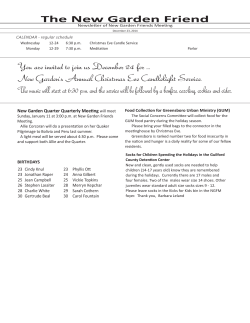
DevotionalTools
DevotionalTools LIVING GOD’S STORY: SEEING GOD JUNE 8-14, 2015 | GENESIS 3:8-15 PARADISE TEMPORARY MONDAY, JUNE 8 | GENESIS 2:3-17 WEDNESDAY, JUNE 10 | GENESIS 3:6-8 If Genesis 1-2 are paradise, then 3 is paradise lost. The first two chapters provide a remarkable picture of creation evolving, growing, even coming together. The Creator and the created; the heavens and the earth; darkness and light; morning and night; day to day; water and sky; land and plants; sun, moon and stars; creatures and blessing; dust and breath; humankind and God. In the center of this paradise stands the tree of the knowledge of good and evil. God tells Adam to not eat of this tree or “you shall die.” When you’re told to not do something, what is the one thing you’d like to do? We know ourselves too well. Paul says it this way: “I do the very things I shouldn’t do, and I don’t do the things I know I should do.” This tension is at the heart of the Garden of Eden story. Do you recognize how broken we all are? Ask God to help you see the reality of our human condition. Relying on her senses of sight and taste and her desire to know more, “she took” (verse 6) and ate. This is the first time in scripture where humankind “takes” instead of receives. Prior to this point, God has provided everything needed for life and health. Here, humankind “takes.” The text tells us that, from that moment on, “their eyes were opened.” For the first time they stop trusting God to lead, guide and provide. Now, with “their eyes wide open,” they begin to move on without God. They see that they are “vulnerable” (naked), so they make a lame attempt to cover themselves. The irony here is that what they choose to cover themselves with will not last. The fig leaf will, in time, wither and disappear. Their attempt to cover is temporary. Can you trust that God will provide everything you need for today? Can you turn away from those things that delight the senses but lead you in the wrong direction? Are there things in your life that bring you satisfaction, but you know this satisfaction is only temporary? Ask God to give you a discerning heart to be able to identify temporary gratification. PARADISE LOST TUESDAY, JUNE 9 | GENESIS 3:1-5 As chapter three opens, the serpent, part of the created order, enters the scene. Crafty and wild, and made by God, the serpent engages the woman in conversation. But there is also cunning here. The serpent begins by casting doubt on what God had previously said to Adam (Ish) and Eve (Ishah). “Did God say, ‘You shall not eat from any tree in the garden’?” The first thing the serpent does is cast doubt on the One who has invited humankind to live in open, transparent, trusting relationship with God. The woman responds, “We may eat of the fruit of the trees in the garden; but God said, ‘You shall not eat of the fruit of the tree in the middle of the garden, nor shall you touch it, or you shall die.’” There is misunderstanding here, or worse. There is a twisting of the word of God. The serpent follows up by casting more doubt, and an outright denial of God’s word: “You will not die.” So the woman and the man disobey God’s command. They refuse to heed the encouragement to live within the healthy boundaries that God has provided for life. If you were there, what choice would you make? Ask God to grow a transparent, trusting relationship between you and God. BLAME THURSDAY, JUNE 11 | GENESIS 3:8-13 They hear God walking in the Garden, but because of their shame and vulnerability, they cannot face the One who promised to provide for them. They hide from God. God calls to Adam (Ish) and asks, “Where are you?” We might ask, “Doesn’t God know where they are? Isn’t God omniscient? Why does God have to ask?” Here God gives Adam the opportunity to freely confess and disclose. But Adam does not. He makes only a half attempt: “I heard the sound of you in the garden, and I was afraid, because I was naked; and I hid myself.” God asks, “Who told you that you were naked?” But God doesn’t wait for Adam to plunge further into shame. This is a grace moment. Then the blaming begins! Adam blames Eve: “This woman …” Adam blames God: “that you gave me …” Eve blames the serpent: “The serpent tricked me …” There’s plenty of blame to go around in this story. Do you quickly blame others, or circumstances, for things that go wrong in your life? Are there some things you need to “own”? Ask God to help you see where you are wrongly blaming God or others. CURSES FRIDAY, JUNE 12 | GENESIS 3:14-15 Here we see the curses brought upon the serpent, the woman and then man. How do we find ourselves in this story? How do we respond to God who has given us all things, all we need for today? Do we gratefully accept what is given to us? Do we help one another? Or do we rely on our senses to drive us? Do we really believe that God will provide? And how does God do that? Or do we, like Eve, so what we think is good, follow after what our eyes delight in, follow after our own sense of wisdom and propriety? Do we trust God’s word and its intent for us, or do we shift and change the word of God to meet our needs? The end result of this bad decision-making is this: God sends Adam and Eve out of the garden into the world to “work very hard to get the things you need.” Ask God to help you see your self-centered tendencies and turn you toward the needs of others. REWRITE SATURDAY, JUNE 13 | GENESIS 2:1-4 These verses take us back in history before the Garden of Eden. God made everything and said it was very good. But something went very wrong. If you had the power to go back in time and do it all over, how would you change the story? “Good,” a new song by Nicole Nordeman (the Story) contains these lyrics: “If I could, I’d rewrite history. I’d choose differently. If I could, I would. I’d leave out the part where I broke Your heart. In the garden’s shade, fix the mess I made. If I could, I would. If I could close my eyes and then dance around again. If I could, I would be who You adored. Why did I need more? When beauty was not trained to hide behind my shame. If I could, I would.” This is the voice of Adam, and he claims that now, knowing what he knows, would go back and change history. It’s an interesting idea, but it’s not going to happen. We’re left as we are, with our human brokenness, struggles, and pain. We’re left needing to work hard for all that we need. Now we know what it means to be unhappy. Ask God to help you trust that God really loves you more than you can ever imagine. FATHERS SUNDAY, JUNE 14 | GENESIS 2:24-25 We typically hear this passage at weddings. On this Father’s Day we honor those men in our life who have loved us and continue to love us. Not every father is perfect. Not any father is perfect, but, as we learn from Adam and Eve, a father is a very human being with all the frailties and failings that come with being human. On this Father’s Day we see those father figures in our lives through the lens of an honest human reality. They aren’t perfect, they can’t be perfect. But they can guide, lead, care, love, provide, bless, encourage, teach, and nurture. When we look back over our lives we can celebrate those times when important “fathers” paid attention to what we needed. This is Father’s Day. Celebrate. Remember. Give thanks.
© Copyright 2025










